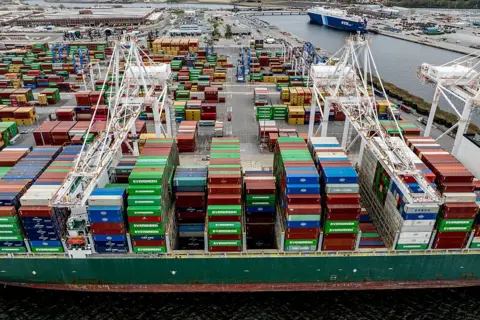
Trump’s High-Stakes Tariff Policy Reshapes Global Auto Industry and Trade Relations
The Trump administration's aggressive tariff strategy on imported vehicles and global goods has sent shockwaves through the automotive industry and the world’s trading system, with far-reaching consequences for consumers, manufacturers, and entire economies. As debates intensify over the 25% tariffs remaining on auto imports and the recent pause on certain other levies, analysts warn that the structural shift in trade policy could signal a pivotal moment for the international economy.

In Detroit and across America’s auto-producing heartland, manufacturers are bracing for seismic changes. Boston Consulting Group estimates that tariffs will heap $110 to $160 billion in annual costs onto the industry, a blow that could erode up to 20% of U.S. new-vehicle market revenues. The Center for Automotive Research projects $107.7 billion in increased expenses for U.S. automakers alone, including nearly $42 billion hitting giants like GM, Ford, and Stellantis.
Employees at facilities such as Nissan's Smyrna plant in Tennessee—one of the world’s largest—now face an uncertain future as the cost of both imported vehicles and essential parts skyrockets. With automakers expected to pass many of these costs to consumers, industry observers anticipate sticker price jumps of $2,000 to $6,000 per vehicle. Already, auto loan rates are hovering near multi-decade highs, further squeezing affordability and potentially driving vehicle sales down by up to 2 million units per year in North America.
"What we're seeing now is a structural shift, driven by policy, that's likely to be long-lasting," said Felix Stellmaszek, BCG’s global automotive lead. Echoing these concerns, Cox Automotive’s Chief Economist Jonathan Smoke warns that "production and sales [will] fall, newly used prices to increase, and some models [could] be eliminated."
The ripple effects extend far beyond U.S. borders. Globally, President Trump’s escalating tariffs—including a sweeping 10% universal rate and a punishing 125% on Chinese imports—are upending trade relationships. While a temporary pause on some levies brought fleeting relief, fundamental changes remain: America’s average import tariff rate now tops a century-high 24%, casting uncertainty over allies and trade partners alike. Developing economies, especially Vietnam, narrowly avoided recession-inducing tariffs but still contend with a 10% floor.
With the U.S. and China jointly representing more than 40% of global economic output, economists fear that an enduring trade battle could stifle growth worldwide. Bloomberg Economics notes that while recent pauses trimmed some tariff rates, "the overall direction of U.S. trade policy has shifted dramatically, with little sign of reversal." The UK, once eyeing new advantages, now faces not only the loss of favorable trade deals but also hefty levies on steel, aluminum, and cars, further narrowing global trade options.
As auto prices climb and supply chains are forced to evolve, consumers, workers, and leaders around the world must grapple with a new era of protectionism and volatility. Will ongoing negotiations and further policy reversals bring relief, or is the auto industry—and global commerce—headed for a prolonged period of uncertainty and contraction?
What are your thoughts on these unprecedented changes? How have tariffs affected your purchasing decisions or business outlook? Join the discussion below and share your perspective.
Related issues news
How will tariffs affect the car market?
The tariffs are expected to raise prices across the board, but several automakers are offering special deals for car shoppers in a bid to prevent sales from sliding dramatically in the first couple of months after the implementation of the tariffs.
Will Trump tariffs affect car prices?
The Kelley Blue Book says tariffs affect the price of new cars rather than directly impacting the price of previously owned cars, but as consumers trade in the next generation of cars that were purchased after tariffs were imposed, those vehicles will have a premium attached to the price.
Does tariff pause affect cars?
Numerous other tariffs Trump has announced since returning to the White House remain in place and are not affected by the pause. That includes: 25% tariffs on all car imports to America, including from the UK.
How will tariffs affect car prices in Canada?
The Canadian countertariff went into effect Wednesday morning in response to U.S. President Donald Trump's tariff on Canadian autos. Mr. Akyurek said various studies have shown that the price of new vehicles affected by the tariff could increase $3,000 to $12,000 in Canada as a result of the trade war.